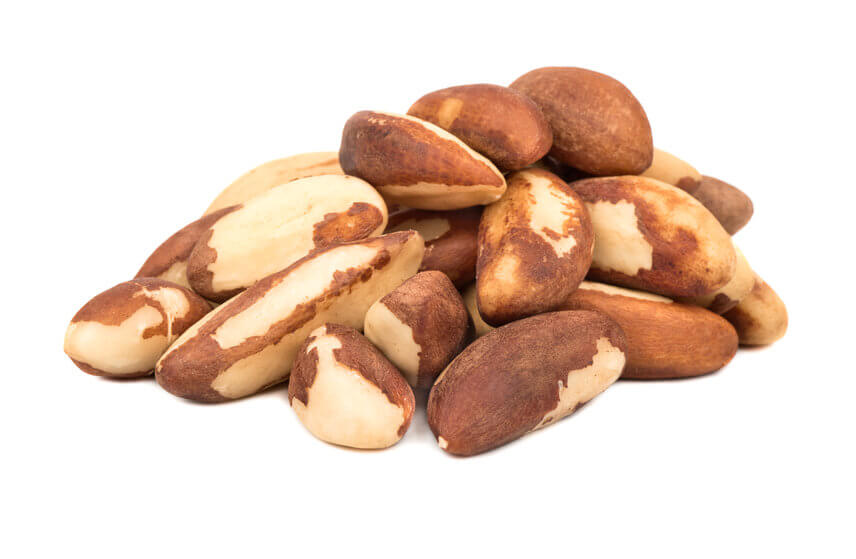By now you’re probably well aware of all the plant-based milk products that can be used as an alternative to cow’s milk. Between almond milk, cashew milk, and even oat milk, there’s no shortage of exotic plant milk alternatives to fill your bowl with. What about Brazil nut milk though? How does it stack up to other types of plant milks? In this article we’ll be going over all of the benefits of Brazil nut milk so you can decide if it’s a good choice for your household.
In short, the primary benefit of Brazil nut milk is that it contains selenium — an essential mineral that is typically found in soil. Just a small serving of Brazil nut milk provides all of the daily selenium recommendations set forth by the National Institutes of Health.
Let’s dig in further, shall we?
Nut-Based Milk Alternatives
Nut-based milk alternatives are nothing new. In fact, they’ve been around for quite some time, and not all of them are nut-based either. Common alternatives include:
- Almond milk
- Cashew milk
- Soybean milk
- Oat milk
- And more
Nut-based milks are typically made by blending the nuts into a milk-like consistency, then straining it through a fine mesh sieve. This process removes the nuts’ fiber/pulp from the milk, resulting in that smooth and creamy liquid that we know as “milk”.
Nut milks are popular among health-conscious consumers who may be looking for an alternative to regular cow’s milk, which tends to be high in saturated fat and cholesterol (not to mention lactose, which can be a digestive irritant for many consumers with lactose intolerance.)
One of the benefits of Brazil nut milk (and other nut milk varieties) is that they tend to make for healthier, plant-based alternatives.
Let’s Talk About Brazil Nut Milk

Believe it or not, Brazil nut milk seems to be somewhat of a novelty compared to other nut milks. It doesn’t appear to have experienced any kind of mainstream recognition yet.
In fact, in doing research for this article, we were unable to find any kind of Brazil nut milk products for sale. Instead, what we found were lots of recipes for making your own Brazil nut milk.
One such recipe from the website, “That Girl Cooks Healthy” demonstrates how to easily make your own Brazil nut milk at home using only Brazil nuts, water, and a little bit of vanilla extract and salt for flavor.
A single 1.5 cup serving of this homemade Brazil nut milk contains:
- Calories: 350
- Carbohydrates: 18g
- Sugar: 11g
- Dietary fiber: 3g
- Protein: 7g
- Fat: 29g
- Saturated fat: 7g
- Sodium: 212mg
- Potassium: 343mg
It should also be noted that another benefit of Brazil nut milk is that it contains trace amounts of vitamin A, calcium, and iron. However, the quantities are so small that they are hardly significant in comparison to daily dietary needs.
What Are The Benefits Of Brazil Nut Milk?
Now that we’ve gone over what exactly Brazil nut milk is, let’s have a look at some of the benefits you’ll enjoy when opting for it over traditional cow’s milk and plant-based milk alternatives.
It Contains No Cholesterol
One of the benefits of Brazil nut milk is that it contains no cholesterol. This makes it an excellent choice for those who are looking to avoid the cholesterol commonly found in cow’s milk.
Cholesterol is a waxy lipid that your body needs but can make sufficiently on its own.
It was once believed that consumption of dietary cholesterol may have a negative impact on cardiovascular health, but recent findings have challenged that assertion.
That said, some consumers prefer to play it safe and keep their cholesterol intake low regardless. Substituting plant-based milks (like Brazil nut milk) can help you accomplish just that.
Excellent Source Of Selenium
Brazil nuts are known for being incredibly rich in selenium — a trace mineral that helps support DNA production, thyroid function, reproductive health, and many other metabolic functions within the body.
According to the National Institutes of Health, selenium deficiency can lead to a rare form of heart disease and male infertility, among other things.
One of the several benefits of Brazil nut milk (as opposed to cow’s milk or almond milk, which have much smaller amounts of selenium than Brazil nuts do,) is that you’ll be able to easily meet your daily recommendations for this essential nutrient.
It’s High In Plant-Based Protein
Protein is responsible for repairing muscle tissue in the body that has been broken down from exercise or any other common activity.
Those following a vegan, vegetarian, or any other plant-based diet may struggle to meet their protein goals as plant-based foods are typically inadequate sources of protein.
As a plant-based protein source, Brazil nut milk can be a great choice for those looking to add more variety to their diets. This is especially true when you compare it to other nut milk alternatives.
Just a single serving of this homemade Brazil nut milk packs 7g of protein!
It Contains A Modest Amount Of Fiber
Another one of the benefits of Brazil nut milk is that it contains fiber.
Fiber is an indigestible form of carbohydrate that your body uses to remove waste. According to Mayo Clinic, fiber consumption can help lower cholesterol and improve bowel health.
Fiber is not typically found in milk products. However, Brazil nut milk contains 3g per serving!
Are There Any Downsides To Brazil Nut Milk?
Now that we’ve gone over a handful of benefits of Brazil nut milk, let’s have a look at some of the disadvantages.
Over-consumption Of Selenium
The greatest benefit Brazil nut milk has to offer also represents its greatest downside — selenium.
In recommended quantities, selenium promotes good health. However, if overconsumed it can pose a range of health problems, according to the National Institutes of Health.
As we went over in a previous article about what happens when you eat too many Brazil nuts, it’s not very difficult to over-consume the selenium in Brazil nuts because they contain it in high quantities.
In fact, a single Brazil nut provides all of the selenium for a day that is recommended for all age groups. And just a handful of these nuts can be enough to put you past the daily upper limit.
Needless to say, daily consumption of Brazil nut milk should be carefully monitored if for no other reason than selenium overconsumption.
It’s High In Saturated Fat
Finally, Brazil nut milk contains a modest amount of saturated fat compared to other plant-based milk alternatives.
Saturated fat is the type of fat that is solid at room temperature. It’s typically found in animal products but can also be found in plant-based foods, like coconut and palm oil.
While not all saturated fats are bad for you, some experts believe that overconsumption of saturated fat can lead to an increased risk for heart disease.
The American Heart Association recommends getting no more than 5% to 6% of your daily calories from saturated fat.
One of the benefits of opting for plant-based alternatives to cow’s milk in the first place is the avoidance of saturated fat. However, Brazil nut milk has just as much saturated fat per serving as whole milk does!
The Bottom Line
Overall, Brazil nut milk is a great choice for those looking for an alternative milk to consider.
It’s high in plant-based protein and contains a little bit of dietary fiber too. However, over-consumption of selenium is a concern, so daily consumption should be monitored. And with just as much saturated fat per serving as whole milk, it’s important to be mindful of your intake.
That said, the benefits of brazil nut milk make it a great choice for those looking to add more plant-based variety to their lives.

